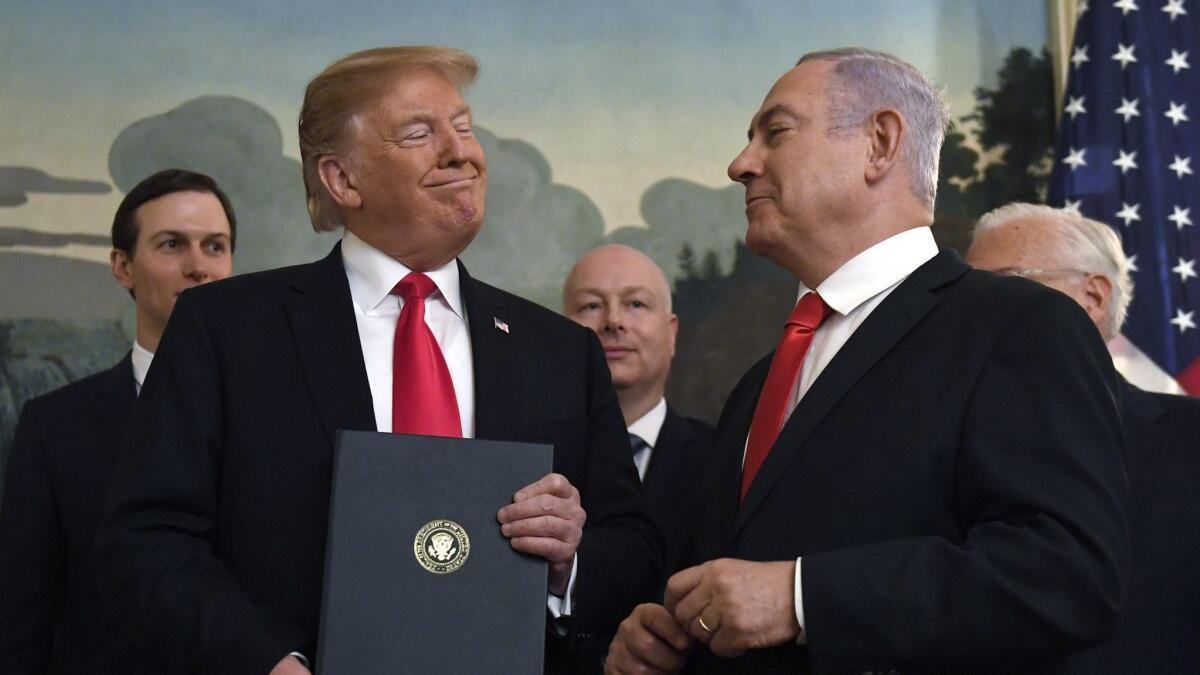Op-Ed: Trumpâs bromance with Netanyahu is about to heat up for Israelâs do-over election

The Trump administration went out of its way to help Prime Minister Benjamin Netanyahu win the April Israeli elections, and even tried to boost him in his failed attempt to form a governing coalition. With a do-over election set for Sept. 17, we can expect an equally determined and flamboyant do-over effort from the White House on the prime ministerâs behalf.
Indeed, for President Trump, no other politicianâs success seems to matter more than Netanyahuâs. They have known each other for years, but the president isnât backing the prime minister for sentimental reasons.
From Trumpâs perspective, helping Netanyahu means currying favor with Israelâs supporters in the U.S., checking Iranâs power, and keeping alive his fantastical dream of an âultimate dealâ between Israel and the Palestinians. The two men also share a strong sense of grievance, driven by what they believe are unfair investigations and mendacious political rivals. Victimhood alone â from the âdeep state,â âfake newsâ and nasty liberals â might well explain the Donald-Bibi bond.
The notion that the United States and Israel wouldnât intervene in each otherâs politics is a nice, principled idea long ago sullied by reality. Trump, however, has taken intervention to extremes, and Netanyahu has tried to return the favor, knowing that part of his appeal to his own base is effective management of relations with Washington.
The notion that the United States and Israel wouldnât intervene in each otherâs politics is a nice, principled idea long ago sullied by reality.
The reelection gambits that Trump has initiated on behalf of his soul mate Netanyahu break sharply with previous precedents. He visited Israel (and Saudi Arabia) on his first foray out of the country after his inauguration. He is the first sitting U.S. president to pray at the Western Wall, the first to even enter Jerusalemâs Old City, underlining Israelâs claims to that disputed territory. A few months later, Trump took the favor farther and undid 70 years of U.S. policy, formally recognizing Jerusalem as the capital of Israel.
The White House has constantly had the prime ministerâs back. At a news conference in Vietnam after Trumpâs second meeting with North Koreaâs Kim Jong Un, the president was told of Netanyahuâs indictment for corruption in Israel. Trump ladled on the praise: âHeâs done a great job as prime minister. Heâs tough. Heâs smart, heâs strong.â
And all of that was before the serious campaigning started for Israelâs April elections. Within three weeks of the vote, Trump hosted Netanyahu at the White House. He also recognized Israeli sovereignty over another piece of disputed territory, the Golan Heights. And the day before the election, he formally designated the Iranian Revolutionary Guard Corps as a foreign terrorist organization, another jab at Israelâs foremost enemy. During Netanyahuâs attempt to form a coalition after his April victory, Trump also weighed in, tweeting that the U.S.-Israeli alliance would remain strong with a Netanyahu-led government.
Although the Trump-Netanyahu bromance is carried out in the context of foreign policy, itâs largely about domestic politics. In 2016, Trump gained support in far-right GOP quarters and among evangelical Christians, not to mention major Jewish campaign donors such as Sheldon Adelson, by boasting that he would be the most pro-Israeli president ever. He won points with his base by castigating President Obama for squeezing Israel on the settlements issue and lambasting (then eventually leaving) his predecessorâs nuclear agreement with Iran, which Netanyahu and Israeli hard-liners vehemently opposed.
So what more can Trump do for Netanyahu between now and the September elections? Plenty.
First, the White House quickly deferred its planned unveiling of the political part of the grand peace plan devised by Trump senior advisor Jared Kushner, so as not to create any tensions between Netanyahu and his right wing. At the same time, Kushner also green-lighted the economic piece of the plan, the so-called Investor Workshop in Bahrain in late June. Arabs and Israelis shaking hands in an Arab capital, with maybe a few token Palestinian private-sector mavericks too, will lend credence to Netanyahuâs claims that his policy of normalizing with Gulf Arabs is working.
Enter the Fray: First takes on the news of the minute Âť
Then at the end of May, U.S. national security advisor John Bolton announced that he would meet with Russian and Israeli representatives in a trilateral summit to discuss Syria, enhancing Netanyahu on the world stage.
When Kushner was in Jerusalem in late May, he presented the prime minister with a U.S. government map he could show off that includes the Golan Heights as part of Israel and signed by Trump with the word ânice.â And the campaign is also touting Trumpâs anti-Palestinian efforts â cutting aid, closing the PLO office in Washington, withdrawing the U.S. from the U.N. agency that deals with Palestinian refugees. Now the Israeli press is speculating about a Trump return visit to Israel, which would be another boost for the prime minister with many voters.
Netanyahu, still under indictment, faces real challenges in the coming election and beyond. Can Trumpâs back pats and favors make the difference? As my grandmother used to say about her chicken soup, it couldnât hurt.
Aaron David Miller, a distinguished fellow at the Woodrow Wilson Center, has been a State Department Middle East advisor and negotiator in Republican and Democratic administrations.
Follow the Opinion section on Twitter @latimesopinionand Facebook
More to Read
A cure for the common opinion
Get thought-provoking perspectives with our weekly newsletter.
You may occasionally receive promotional content from the Los Angeles Times.










